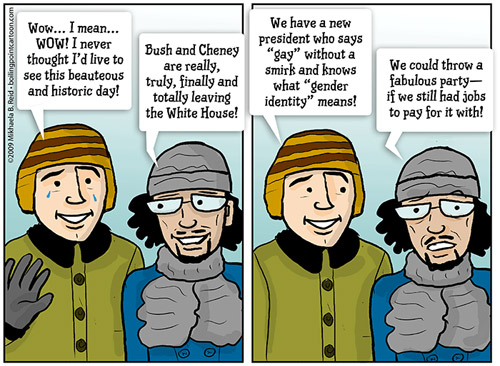
- Follow us on Twitter: @inthefray
- Comment on stories or like us on Facebook
- Subscribe to our free email newsletter
- Send us your writing, photography, or artwork
- Republish our Creative Commons-licensed content



even if you've never been to that station before, you have a sixth sense about which end of the platform to watch for the next arriving train.
(Note: Regular riders will always stare down the tracks looking for the headlights of the next train. It doesn't matter if a train just left the station two seconds ago.)
Here's a fascinating piece from 60 Minutes that links last year's disastrous surge in oil prices to rampant speculation made possible by deregulation — the very kind of deregulation that Enron, at its peak, lobbied aggressively for, and that other firms and investors took full advantage of, securing handsome profits before the bubble burst.
Here’s a fascinating piece from 60 Minutes that links last year’s disastrous surge in oil prices to rampant speculation made possible by deregulation — the very kind of deregulation that Enron, at its peak, lobbied aggressively for, and that other firms and investors took full advantage of, securing handsome profits before the bubble burst.
The deregulation that Enron successfully pushed for in electricity markets was painful enough in California, which suffered from price spikes and rolling blackouts in large part because of Enron’s manipulation of the unregulated market. But the worldwide effect of deregulation on oil prices seems to dwarf that crisis. Until the second quarter of last year, global oil supplies were increasing and global demand was going down — but the price of oil still went way up, driven by investor demand.
Some of the investors who sunk their money into oil futures may have took a hit once the market nosedived — 60 Minutes links the fall of Lehman Brothers and AIG, both heavily invested in oil markets, to that downturn — but the real losers were the mom-and-pop businesses and paycheck-to-paycheck families who got clobbered when gas went up to $4 a gallon. From truck drivers to gas station owners to 9-to-5 commuters, these folks didn’t have the kinds of finances that could stay afloat amid such cataclysmic waves of market volatility.
It’s unclear whether investment houses such as Morgan Stanley, which own large chunks of the oil wholesale business and also were advising investors to put their money into commodities futures — thus driving up the price — were manipulating the market to their benefit in the same way that Enron was in California. But that’s the thing about deregulation: No one has the authority to find out what’s really going on.
It seems that last year’s oil spike was yet another way that deregulation has contributed to our current economic malaise. Lax oversight encourages risky behavior, which is not necessarily bad: More risk means more reward on the way up, if also more remorse on the way down. But in the mortgage market, and in the electricity and oil markets, deregulation also opened possibilities and altered the incentives, so that more people got greedy and opted for less than ethical ways to make a buck. From unscrupulous lenders and borrowers to firms manipulating markets, everyone was cashing in when the government’s back was turned.
Victor Tan Chen Victor Tan Chen is In The Fray's editor in chief and the author of Cut Loose: Jobless and Hopeless in an Unfair Economy. Site: victortanchen.com | Facebook | Twitter: @victortanchen
NPR recently aired a segment on two bloggers from Gaza and Israel. The Israeli calls himself Hope Man, the Palestinian calls himself Peace Man, and together they write the blog Life must go on in Gaza and Sderot.
NPR recently aired a segment on two bloggers from Gaza and Israel. The Israeli calls himself Hope Man, the Palestinian calls himself Peace Man, and together they write the blog Life must go on in Gaza and Sderot.
Hope Man, a.k.a. Eric Yellin, lives in Sderot, a city that has faced ongoing rocket attacks from Gaza. Peace Man, who writes anonymously out of fear for his safety, lives in Sajaiya, a densely populated Gazan neighborhood with militant activity. In spite of the opposition (and danger, in Peace Man's case) they face from their own communities, the two have, over time, become steadfast friends. Says Hope Man (from the transcript):
HOPE MAN: … as soon as I started meeting people, it created a real connection and understanding that on the other side of the border, there are people exactly like us who are suffering. We are suffering, too, through this conflict. But the only way to end this was through some kind of connection and dialogue.
NPR: And is that, do you think, the experience of Peace Man in Gaza?
HOPE MAN: Well, absolutely. I think — Peace Man has told me this so many times that, first of all, for him it was the first time ever to meet Israelis. And for him, they were always the enemy, always the oppressor. It took a while to create trust even between the two of us. And I think that over time, we have really become friends. And I think there is full and complete trust. I'd trust him with my life, and I think vice versa.
The two bloggers say that the media coverage of the conflict is "extremely biased" on both sides. They call for an immediate end to the violence and a return to dialogue. Says Peace Man:
We have said from the beginning that violence will bring more violence. I hope the world will understand that’s there people want to live safe with dignity and peace. I hope I will have the chance to write you again.
Hope Man, who is involved with the grassroots peace group Other Voice, says dialogue could have brought about a workable solution to the crisis during the five previous months of ceasefire if leaders on both sides had made a real effort rather than just blaming one another. But if the politicians won't act, he says, he and other residents of Sderot and Gaza will.
What me and others are doing is continuing the dialog with friends in Gaza. We are working to widen and deepen this dialog with more people on both sides. The day after the war we want to start finding ways to work together and create a normality. We are only several kilometers apart and that will never change. It is extremely important to widen our dialog and create trust between those that are willing to talk. To share our stories, fears and hopes.
The day after the war we need a new beginning. Let's start planting seeds of humanity and trust now.
It seems that Hope Man and Peace Man are following Gandhi's advice to "be the change you wish to see in the world." It's easy to be cynical and think that individuals are powerless to alter the decisions from up top. But in the long run, in the grand scheme, leaders react to the social forces surrounding them. Every personal connection across borders makes war less likely. Every instance of Hope and Peace is another trumpet sounding against the walls that separate us.
Victor Tan Chen Victor Tan Chen is In The Fray's editor in chief and the author of Cut Loose: Jobless and Hopeless in an Unfair Economy. Site: victortanchen.com | Facebook | Twitter: @victortanchen
You can't make this stuff up. Check out this Washington Post story about criticism of Obama's choice of Leon Panetta as CIA director.
You can't make this stuff up. Check out this Washington Post story about criticism of Obama's choice of Leon Panetta as CIA director:
Although several top CIA officials who have interacted with Obama since the election expressed admiration for his grasp of the issues, the transition process has clearly left a bad taste. One senior official said that "the process was completely opaque" and that the agency was neither consulted nor informed. The official was among several who discussed the subject on the condition of anonymity.
Yes, officials from the most secretive agency in government are complaining about the "opaqueness" of the process. That's like the arsonist who lectured kids about fire safety.
Victor Tan Chen Victor Tan Chen is In The Fray's editor in chief and the author of Cut Loose: Jobless and Hopeless in an Unfair Economy. Site: victortanchen.com | Facebook | Twitter: @victortanchen
2008 was a year of tumult and turmoil around the world. A massive earthquake shook China. Months later, a figurative earthquake shook the global financial system as the world credit markets ground to a halt. Oil prices climbed to record peaks over the summer and crashed with the global economy as demand vanished. Chaos in Iraq has started to wane, but the Taliban is resurgent in Afghanistan. As we enter 2009, it seems that there are more uncertainties in the world than guarantees.
Now that 2008 rests in the history books, it is safe to look back over the year. Here at In The Fray, we published another eleven great issues, all of which featured the hard work of our volunteers, contributors, and editorial staff. In The Fray would like to extend heartfelt thanks to each and every person who has worked to make our magazine as extraordinary as it is.
In that spirit, ITF’s editors would like to highlight a few of the best stories from 2008:
IDENTIFY: Where the Moon Is a Hole in the Sky by Jane Varley
THROUGH THE LOOKING GLASS: Buenos Aires by Suan Pineda
INTERACT: Muslim/Mormon by Farnad Darnell
COMMENTARY: The Black Church Arrives on America’s Doorstep by Mark Winston Griffith
ACTIVIST’S CORNER: Sex in Pakistan by Sarah Marian Seltzer
OFF THE SHELF: You Really Can’t Go Home Again by Amy Brozio-Andrews
IMAGINE: The Jaunt by Ashish Mehta
IMAGE: Afghanistan by Stephanie Yao
Help keep us publishing by visiting inthefray.org/donate and giving what you can. Thanks, and keep reading in 2009!
Aaron Richner I am a writer/editor turned web developer. I've served as both Editor-in-chief and Technical Developer of In The Fray Magazine over the past 5 years. I am gainfully employed, writing, editing and developing on the web for a small private college in Duluth, MN. I enjoy both silence and heavy metal, John Milton and Stephen King, sunrise and sunset. Like all of us, I contain multitudes.



